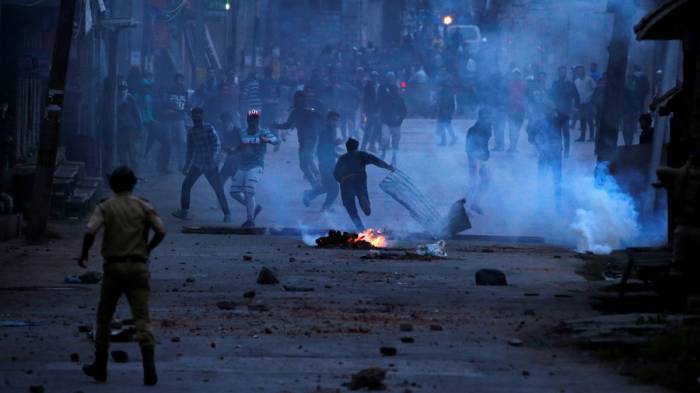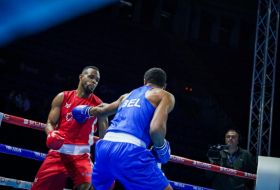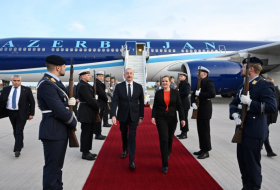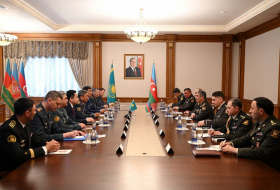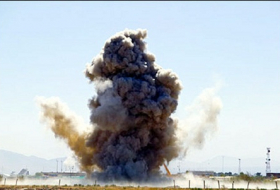Violence can rear its head in Kashmir at almost any time and did so again the other week when five suspected armed separatists were gunned down by Indian soldiers and, in a separate incident, a tourist was killed as stone-throwing protesters clashed with police in Shopia.
The violent tug of war involving religious and nationalist groups from both Pakistan and India exists since independence in 1947, when British India broke up into the Muslim majority Pakistan and the largely Hindu populated India. The conflict is a veritable snare of political and armed actors who either want Kashmiri freedom, a union with Pakistan, or from an Indian government perspective, solidifying the status quo.
Since 1947 three wars have broken out between the two nations, as well as countless bloody skirmishes on the ground of the contested Kashmir region, which is around 70 percent Muslim, and owned by India. China has also claimed a stake to the Aksai Chin area near its border.
Last April, peaceful student protests descended into fierce confrontations with Jammu and Kashmir police over heavy handedness by security forces. It’s part of a new movement being witnessed in the region, one which, according to the International Kashmir Lobby Group, involves Kashmiri youths that up until recently had been politically withdrawn.
Kashmiri youth movement
Ahmed Quraishi, executive director at the International Kashmir Lobby Group, told RT.com that recent protests have expanded beyond the usual political figures. He says there’s a greater push for a national identity among the next generation.
“Mostly young people are involved in the recent flare-ups,” Quraishi said.
“Traditionally it has been political activists or people involved in religious groups. But this time we’re seeing a wider penetration of the protest movement and we’re seeing young college students, who traditionally have not been involved in violent or political protest in the past. There’s a heightened sense of worry from the Indian government.”

Demonstrators throw stones towards Indian police during a protest against the recent killings in Kashmir, in Srinagar May 8, 2018 © Danish Ismail / Reuters
The protests have moved past religion, and are now scooping up Kashmiri youths who feel alienated by the Indian government’s heavy hand, Quraishi says.
“India has relied too much on punitive measures and the military than on political options,” he told RT.com.
“We see Kashmiris who are not Muslim, who are maybe Sikh, Hindu and Buddhist, who may not join the separatist movement but agree that the Indian government is using too much punitive measures. So I think there is a national character to this movement. And what supports this is that a large proportion of the young people who are on the streets right now are demanding independence. It’s really not religious, it’s a nationalist expression.”
Pakistan’s president Mamnoon Hussain has called for the people of Kashmir to be allowed to exercise their right to self-determination. It would most likely mean a plebiscite. But India has so far given any idea of a vote short shrift, since it considers Kashmir to be an important part of their country and has done so for seven decades.
Successive Indian governments have accused Pakistan of failing to control, and even funding, militant separatist groups like Jaish-e-Mohammad, which was blamed for an attack on an Indian army base that killed six in Jammu last year. In 2010, Pakistan’s Punjab province was forced to deny that humanitarian funds given to a charity ended up in the hands of a group known as ‘The Army of God’ or Lashkar-e-Taiba.

People are seen through a bullet hole in a window after a gun battle at Turkewangam village in Kashmir's Shopian district, May 3, 2018 © Danish Ismail / Reuters
Quraishi believes the only way to even begin resolving the situation is through a political process. Otherwise, there could be international intervention in the future. “If there is international intervention it will mostly be by Western powers and I’m not sure the extent that will be to the interests of India and Pakistan,” he said.
“The first thing that needs to be done by India is to reduce its military footprint. Obviously India can not completely withdraw the military - that’s not possible - because there will be chaos. You cannot resolve this issue only through the military - they’ve tried that for seven decades, it has only worsened. So India and Pakistan and Kashmiris need to sit together… the Kashmiris deserve peace, they deserve to live their life.”

Calcutta policemen use tear gas bombs during the communal riots in the city (Photo by Keystone/Getty Images) / Getty Images
After partition, Kashmir remained an independent state. But the princely state’s autonomy lasted only a matter of weeks until October 1947 when the Poonch rebellion - an uprising of Muslim activists and Pakistani tribesmen against the ruling Maharaja - pushed the government to seek military help from India. It led to Kashmir’s accession to India.
Kashmir separatist political group All Parties Hurriyat put the death toll of the conflict at more than 100,000. Meanwhile, India has stated the war has cost the lives of around 47,000 people. Since a ceasefire in 1949, the United Nations has monitored military movements and a peacekeeping group made up of soldiers largely from Croatia, South Korea, the Philippines and Sweden have been permanently stationed around Kashmir since 1971.
Volatile relations
Sreeram Chaulia, professor at the Jindal School of International affairs in India, believes tensions have ratcheted up in recent weeks due to an upcoming election in Pakistan. Pakistan’s alleged links to armed factions targeting Indian security forces is also a big element.
Speaking to RT.com, Chaulia suggested discussions about what to do with Kashmir will become more urgent as politicians from both sides canvass for nationalist approval in upcoming elections.
“Kashmir is a long standing problem with many ups and downs. The elections in Pakistan are coming up in July and there is an effort to show the Pakistani public that the military and the intelligence agencies will steadfastly defend what they consider to be the freedom struggle in Kashmir,” he told RT.com.
“So I think the fighting, the protests as well as the stone pelting and the militancy, all these are linked to the inner domestic developments in Pakistan because many of the separatists in Indian Kashmir receive financing and training from the Pakistani side,” he said.
Matters are not being helped by the fact that for India, Kashmir is an equally important political trophy.
“There is going to be a significant increase in the tensions this year... India is also going to face elections in about a year so there will be pressure in India to also respond nationalistically.”
“It takes two to tango and Kashmir is a cycle of reaction and tit for tat retaliation,” Chaulia said.
“From the Indian point of view, I think the issue is attacks on military camps and civilians by jihadist groups. The Indian view is that this is not a freedom or self-determination struggle by Kashmiri muslims, but instead an instigated problem from across the border.”
More about: Kashmir








